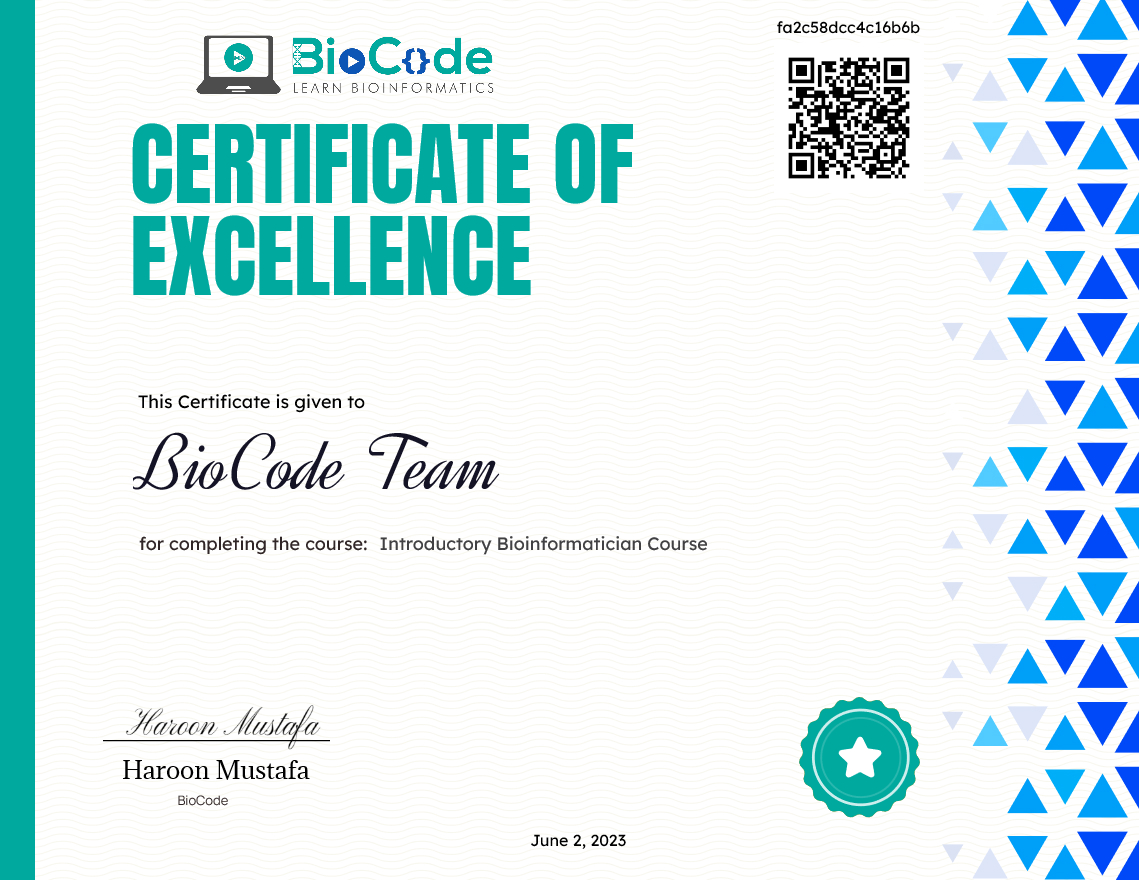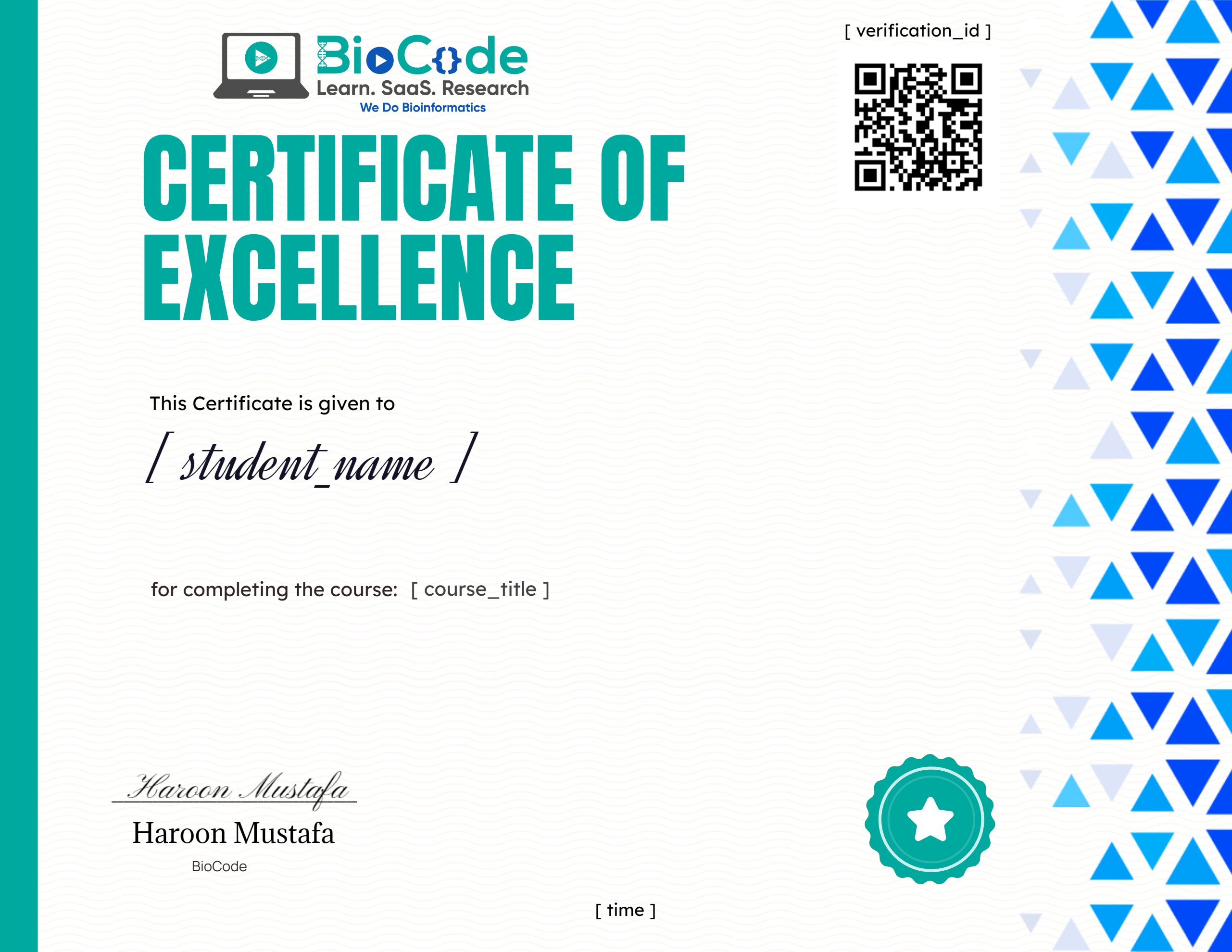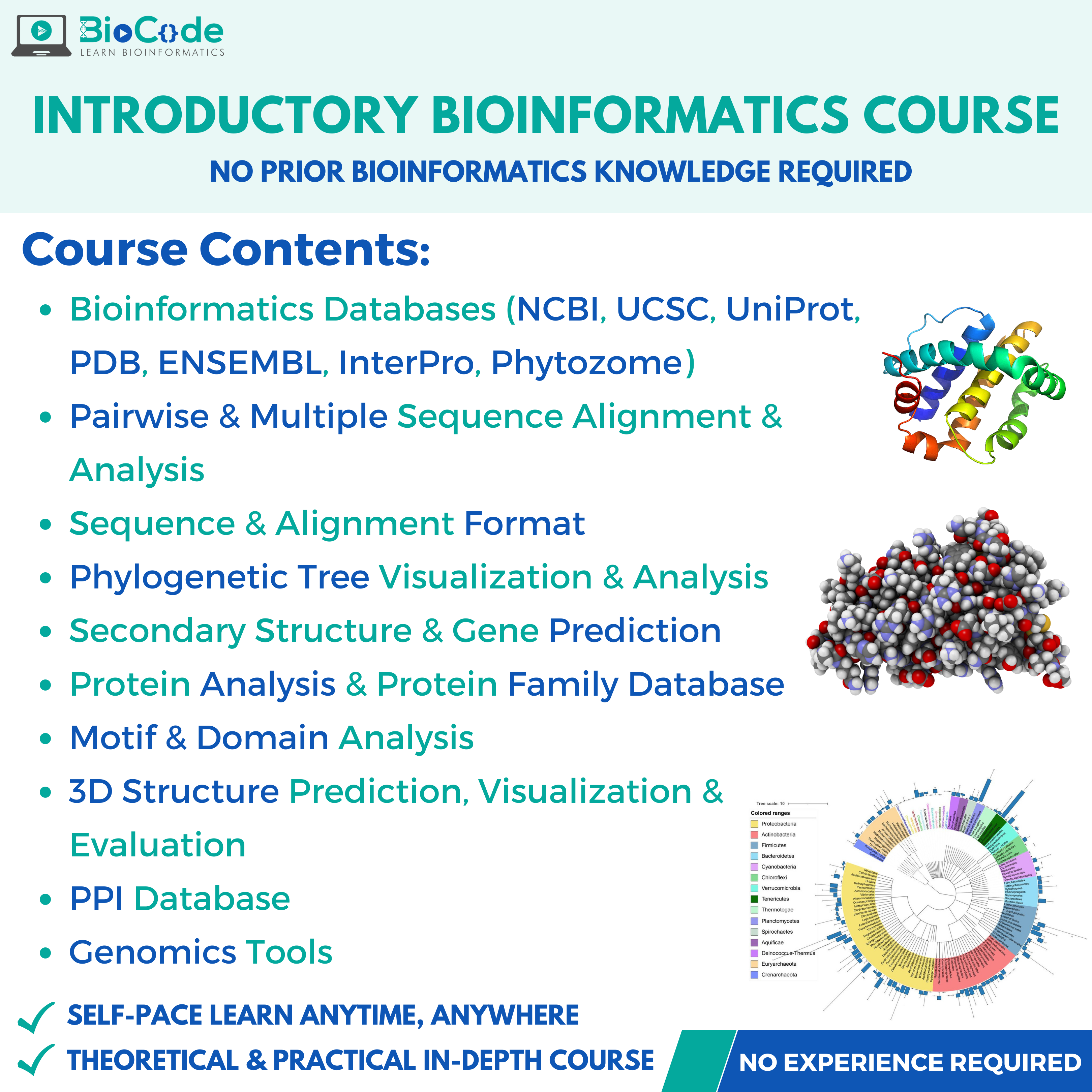Introductory Bioinformatician Course
About Course
Introductory Bioinformatician Course Allows You To Level-up Your Bioinformatician Skills From Basic to Introductory Level
Being a Bioinformatician means you’ve to learn how to retrieve and analyze biological data in the most efficient way, to learn how to align & analyze biological sequences to predict the evolutionary histories between them, to find out the conserved patterns, to learn how to predict coding regions or genes from a raw nucleotide sequence, and much more.
One of the biggest applications of Bioinformatics is the prediction of 3D structures of biological molecules from their (1D) linear sequences. It is important to analyze the protein structures, because of the fact that the structural features of proteins can shed light on their biological functions.
To efficiently deal with huge genomic and proteomic data often requires writing short scripts or patches of code to computationally analyze the biological datasets, rather than comparing and analyzing such huge datasets manually. Hence, the major part of Bioinformatics revolves around analyzing biological datasets computationally.
In this course you’ll learn the fundamentals of Bioinformatics. Along with the most commonly utilized biological databases, how to find conserved patterns and variable regions within sequence alignments & analysis and perform phylogenetic analysis to find out the evolutionarily related species/sequences, you’ll also be able to predict, visualize and evaluate 3D structures of proteins. You’ll also be able to write your first script in Python & R, Python data structures such as lists, strings, dictionaries and various built-in functions and packages provided by R. Along with, how to read/write Bioinformatics files, work with loops and how to control the flow of your program and script.
Joining and learning from the Introductory Bioinformatician Course can enhance your biological career by learning through various useful & informative pre-recorded lectures on Bioinformatics tools, databases, servers and biological programming in Python.

Course Content
Bioinformatics Databases
-
Introduction to National Center of Biotechnology Information (NCBI)
18:02 -
Sequence Analysis
17:59 -
Sequence Retrieval from NCBI
16:17 -
PubMed Central & ENTREZ
11:07 -
GenBank: Nucleotide Database on NCBI
06:50 -
FASTA vs. GenBank
18:26 -
Gene Database: A Comprehensive Gene Database
30:21 -
NCBI Genomes & NCBI Assembly: Retrieval of Genomes
36:14 -
RefSeq Database: Retrieval of Single Reference Sequences
11:16 -
BLAST Database Searching
25:37 -
Introduction to Molecular Modeling Database
08:07 -
Database of Short Genetic Variations (dbSNP)
12:16 -
HomoloGene: Discovery of Gene and Protein Families
06:11 -
Taxonomy
09:57 -
Introduction to UCSC Genome Browser & SARS-CoV-2 Viral Genome
13:40 -
Retrieve an Entire Genome & Retrieval of SARS-CoV-2 Viral Genome
09:41 -
Retrieval of Genomic Data & Annotation of SARS-CoV-2 Viral Genome
05:30 -
Table Browser & SARS-CoV-2 Viral Genome
12:16 -
Visualization of Genomic Data on the Genome Browser & SARS-CoV-2 Genome
10:51 -
Introduction to ENSEMBL
07:50 -
Retrieval of a Gene-Protein-Chromosomal Region
18:02 -
Genome Assembly Retrieval and Analysis
10:24 -
Gene Analysis & Annotation
34:40 -
Variation Analysis
24:37 -
ENSEMBL BLAST/BLAT
15:08 -
Regulation – Understand the Influence of Regulatory Elements on Genes
04:19 -
Comparative Genomics Analysis
05:35 -
Introduction to Phytozome
09:39 -
Interpret Plant Genome Records
09:07 -
Download an Entire Plant Genome & Proteome
26:41 -
Keyword or BLAST Search in a Plant Genome
15:58 -
Visualize a Plant Genome Using JBrowse
17:38 -
Genome Reference Consortium (GRC)
07:48 -
BioProject
06:40 -
BioSystems
04:16 -
BioSample
02:56 -
Sequence Read Archive (SRA)
07:15 -
Introduction to Gene Expression Omnibus Database
09:16 -
Gene Expression Omnibus – Platforms
05:42 -
Gene Expression Omnibus – Samples
04:16 -
Gene Expression Omnibus – Series
04:01 -
Gene Expression Omnibus – Datasets
04:45
Bioinformatics File Formats
Protein Databases & Analysis
Sequence Alignment & Analysis
Phylogenetic Analysis
Secondary Structure Prediction
3D Structure Prediction
3D Structure Visualization
3D Structure Evaluation
Gene Prediction
PPI Database
Genomics Tools
Python
R
Exercise
Earn a certificate
Add this certificate to your resume to demonstrate your skills & increase your chances of getting noticed.

Student Ratings & Reviews


